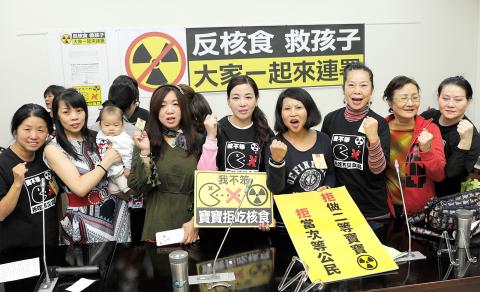Chinese Nationalist Party (KMT) Vice Chairman Hau Lung-bin (郝龍斌) yesterday called for a referendum on easing a food import ban from five Japanese prefectures to “stop the addle-brained government,” as the KMT caucus announced plans to launch a nationwide petition to exert further pressure on the Democratic Progressive Party (DPP) administration.
“On Tuesday, Japan’s Interchange Association Chairman Mitsuo Ohashi criticized Taiwan’s concerns about potentially radiation-contaminated Japanese food products as ‘unsubstantiated comments’ and called on President Tsai Ing-wen’s (蔡英文) government to lift the import ban,” Hau said on Facebook.
The DPP’s attempts to “sacrifice public food safety in exchange for diplomatic relations” in the past six months have galvanized disputes and public unrest, Hau said, adding he regrets that the Tsai administration has chosen to act against public opinion.

Photo: CNA
Hau said that when a government is turning a blind eye and a deaf ear to people’s opposition and anger, the only remaining option is to resort to direct democracy and check and balance the DPP’s legislative majority via a referendum.
“Despite the high threshold for passing referendums, this is people’s last resort to stopping an addle-brained government,” he added.
Given that all six referendums held since the 2003 promulgation of the Referendum Act (公民投票法) were initiated by political parties and centered on political issues, a plebiscite on the import ban would be a true realization of giving people a direct say in public affairs, Hau said.
Hau’s office said the proposed referendum would not be initiated by the party, but rather through cooperation with civic groups.
According to the act, a referendum proposal requires signatures from no less than 0.5 percent of the total number of voters in the latest presidential election. After the proposal is reviewed, the second stage is to gather signatures from 5 percent of voters for a referendum to be set up.
A 50 percent turnout of eligible voters is also required for a referendum to be declared legitimate.
Hau made the remarks amid reports that the government is mulling lifting the ban it imposed on food products from Fukushima, Ibaraki, Tochigi, Gunma and Chiba prefectures in March 2011.
KMT Culture and Communications Committee deputy director Tang Te-ming (唐德明), in response to media inquiries about Hau’s plan, said that the party is campaigning nationwide with a signature drive, but a referendum is the public’s right, so it would be a good way to express public discontent.
Separately yesterday, the KMT caucus held a news conference at the legislature to announce its plan to initiate a nationwide petition on Sunday to deter the government from relaxing the import ban.
“We have repeatedly stressed the importance of food safety. The KMT caucus’ stance is to safeguard public health, given that our government has played dumb and acted against the people. We must resort to direct public opinion,” KMT caucus Secretary-General Johnny Chiang (江啟臣) said.
Chiang welcomed efforts by civic groups proposing a referendum.
Additional Reporting by Shih Hsiao-kuang

Alain Robert, known as the "French Spider-Man," praised Alex Honnold as exceptionally well-prepared after the US climber completed a free solo ascent of Taipei 101 yesterday. Robert said Honnold's ascent of the 508m-tall skyscraper in just more than one-and-a-half hours without using safety ropes or equipment was a remarkable achievement. "This is my life," he said in an interview conducted in French, adding that he liked the feeling of being "on the edge of danger." The 63-year-old Frenchman climbed Taipei 101 using ropes in December 2004, taking about four hours to reach the top. On a one-to-10 scale of difficulty, Robert said Taipei 101

Nipah virus infection is to be officially listed as a category 5 notifiable infectious disease in Taiwan in March, while clinical treatment guidelines are being formulated, the Centers for Disease Control (CDC) said yesterday. With Nipah infections being reported in other countries and considering its relatively high fatality rate, the centers on Jan. 16 announced that it would be listed as a notifiable infectious disease to bolster the nation’s systematic early warning system and increase public awareness, the CDC said. Bangladesh reported four fatal cases last year in separate districts, with three linked to raw date palm sap consumption, CDC Epidemic Intelligence

US climber Alex Honnold left Taiwan this morning a day after completing a free-solo ascent of Taipei 101, a feat that drew cheers from onlookers and gained widespread international attention. Honnold yesterday scaled the 101-story skyscraper without a rope or safety harness. The climb — the highest urban free-solo ascent ever attempted — took just more than 90 minutes and was streamed live on Netflix. It was covered by major international news outlets including CNN, the New York Times, the Guardian and the Wall Street Journal. As Honnold prepared to leave Taiwan today, he attracted a crowd when he and his wife, Sanni,

Taiwanese and US defense groups are collaborating to introduce deployable, semi-autonomous manufacturing systems for drones and components in a boost to the nation’s supply chain resilience. Taiwan’s G-Tech Optroelectronics Corp subsidiary GTOC and the US’ Aerkomm Inc on Friday announced an agreement with fellow US-based Firestorm Lab to adopt the latter’s xCell, a technology featuring 3D printers fitted in 6.1m container units. The systems enable aerial platforms and parts to be produced in high volumes from dispersed nodes capable of rapid redeployment, to minimize the risk of enemy strikes and to meet field requirements, they said. Firestorm chief technology officer Ian Muceus said